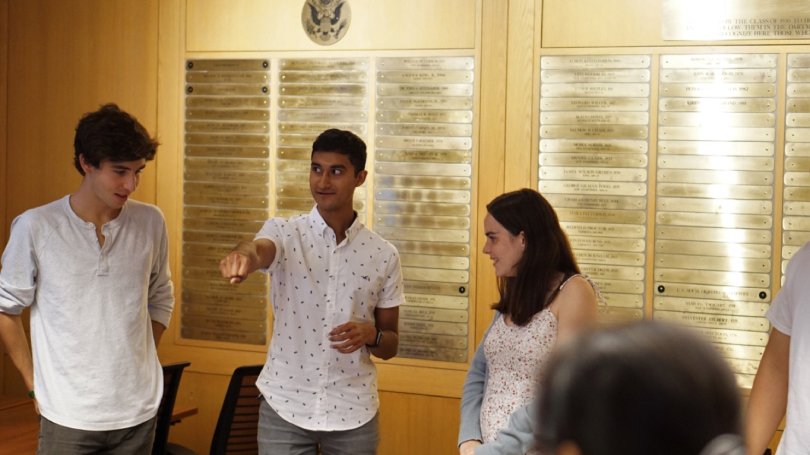
- Public Policy
- Leadership
- Funding
- News & Events
- About the Center
Back to Top Nav
Back to Top Nav
Back to Top Nav
Back to Top Nav
Each fall, winter, and spring, the Rockefeller Global Leadership Program (RGLP) brings together student leaders to increase their understanding of global leadership and intercultural competency. Through weekly sessions with speakers and a culminating experience to either Boston or Montreal, the students are able to learn about themselves and cross-cultural leadership.
Fall 2019 participants were asked to write a blog post, reflecting on the topics and lessons learned throughout the program. Below are reflections from the Fall 2019 cohort who spent a weekend in Montreal as part of their culminating experience.
The Rockefeller Global Leadership Program has showed me how to engage in dialogue across difference. To do this effectively, there are certain tools that are necessary: self-understanding, empathy, and adaptability. In the following post, I will explain how to use these tools effectively to bridge dialogue across difference.
The first tool is self-understanding. Self-understanding is essential to understanding not only yourself, but those around you. Self-understanding means you understand your values, cultural background, and personal characteristics. A strong sense of self helps you understand your intrinsic motivations when you approach a conversation. The best way to develop a stronger sense of self is through reflection and discussion. For example, brainstorm the most important aspects of your identity. For my identity, the most important aspects are my Midwestern roots, South Indian descent, and political affiliation. These aspects shape the way I define myself: meticulous, driven, and caring.
The second tool is empathy. Empathy is the ability to understand someone’s feelings because you can put yourself in that person’s shoes. Empathy is important because you begin to see things from a different lens than your own and discover new ways to build dialogue. One way to build empathy is to imagine you are a person engaging in a new activity that you have no prior experience with (i.e. traveling to a new country, etc.). Examine how the situation would make you feel and how you would deal with it, if you were that person. By engaging in exercises like these, you will develop a better understanding of how others see the world, allowing you to more effectively speak across difference.
The third tool is adaptability. According to Dr. Milton Bennett, adaptability is a person’s ability to “intentionally change their behavior to communicate more effectively in another culture” (“Intercultural Competence for Global Leadership”). We can strengthen this ability by attempting to evaluate situations from multiple, unique perspectives. Imagine how two people from different cultural backgrounds might approach a difficult situation. Such exercises will enable you to better adapt your dialogue across difference.
In conclusion, this program has revealed how self-understanding, empathy, and adaptability can be used to build productive dialogue across cultural differences.
-Written by Sachin Shiva ’22, Fall 2019 RGLP Participant
Disclaimer: The views and opinions expressed here are the author’s own and do not necessarily represent the views and opinions of the Rockefeller Center or constitute an endorsement by the Center.